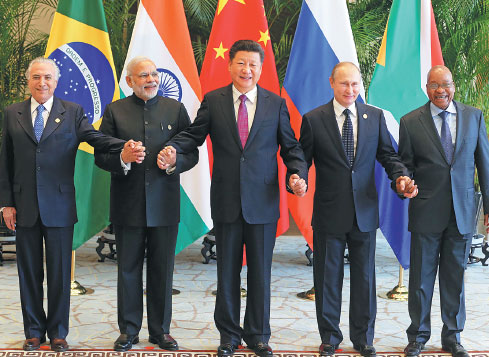 |
|
President Xi Jinping (center) takes a group photo with Indian Prime Minister Narendra Modi (2nd left), Brazilian President Michel Temer (left), Russian President Vladimir Putin (2nd right) and South African President Jacob Zuma (right) ahead of the G20 Summit in Hangzhou, Zhejiang, on Sunday. Xu Jingxing / China Daily |
This year, China assumes the rotating presidency of BRICS, the group comprising Brazil, Russia, India, China and South Africa. This presents a rare opportunity for the bloc to deepen cooperation in a wide range of fields, and thus, help anchor the international organization in a better position to tackle global challenges and uncertainties.
In his New Year message to the leaders of BRICS countries, President Xi Jinping said China remains committed to enhancing partnerships and ushering in an even brighter future for all. The ninth summit of the leaders of BRICS is scheduled to be held in Xiamen, a coastal city in East China's Fujian province, in September.
From January to September last year, the Chinese economy grew at 6.7 percent and it can still boast to be one of the fastest growing economies in the world. In the next five years, its total volume of imports is expected to reach $8 trillion, and accumulated overseas investments will top $750 billion. And over that period, Chinese are expected to make 700 million trips overseas.
Thus there can be no denying the fact that China, as a leading emerging economy, is brimming with vitality and continues to provide demand, business opportunities and confidence to the sluggish world economy.
This will help China contribute its wisdom and solutions to BRICS' future development in its capacity as the group's president this year.
Since its birth in 2006, BRICS has gone beyond an economic acronym pleasant to the ear: It has become one of the most important locomotives for the world's economic development
In the past decade, the bloc has contributed more than half the global growth. With 42.6 percent of the world's total population and roughly one-third of the world's land area, it has a combined GDP that accounts for about one-fifth of the world's total.
At the same time, the group, with its rising international clout, has become an indispensable force behind global economic governance reforms and international financial stability.
Looking forward, the gloomy global economic picture and falls in commodity prices have brought a lingering slowdown to haunt the BRICS' economies, overshadowing their effectiveness as drivers of the global economy.
But the five economies have showed resilience thanks to their multi-faceted mechanism of cooperation and huge potential. Despite the challenges, BRICS members have abundant natural and human resources, vast markets, huge growth potential and bright prospects in trade and investment.
Closer inter-BRICS cooperation and better coordination in multilateral platforms is the key to cope with the challenges and complexities of the global economic and political landscape.
Apart from carrying out structural reforms to make their growth more balanced and sustainable, the five economies also need to coordinate their development strategies through such vehicles as the New Development Bank, the Asian Infrastructure Investment Bank and the Belt and Road Initiative (the Silk Road Economic Belt and 21st Century Maritime Silk Road).
In the international arena, BRICS countries are expected to provide more solutions to gnawing global issues including terrorism and climate change through closer coordination. As a bloc that represents the interests of the developing world, BRICS is also counted on to drive the wheels of South-South Cooperation, improve global governance and establish a fair, just and inclusive international order.
Cooperation in economic and political fields has over the years emerged as the two "wheels" of BRICS. The rise of the five emerging economies has brought profound changes to the world political and economic landscape. Under such circumstances, the group is bound to play a bigger role in international affairs as there is still much to be desired both in the international system and global governance.
Overall, there are enough reasons to believe BRICS will embrace an even brighter decade, which will also be a boon to the rest of the world.
The author is deputy editor-in-chief of China Daily Asia Pacific.


The year 2016 marks my second time saying farewell to full-time motherhood and back to "normal".